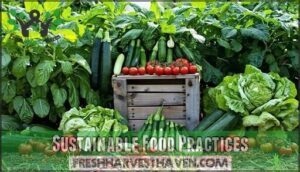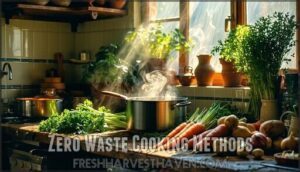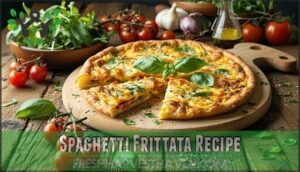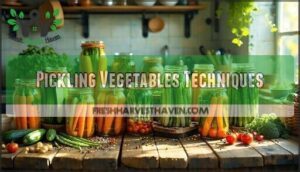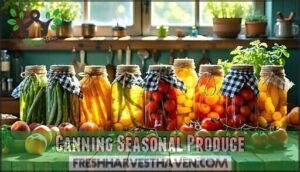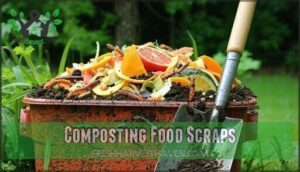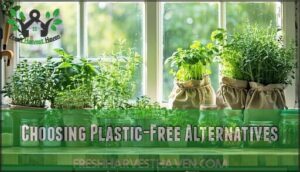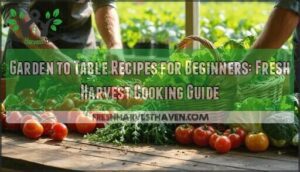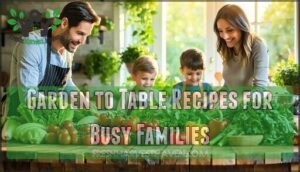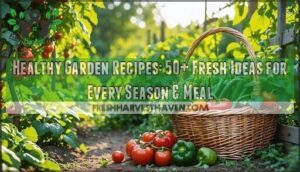This site is supported by our readers. We may earn a commission, at no cost to you, if you purchase through links.
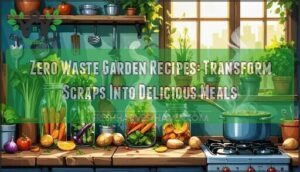 You’re reducing your environmental footprint by exploring zero waste garden recipes.
You’re reducing your environmental footprint by exploring zero waste garden recipes.
This approach helps you transform scraps into delicious meals, reducing food waste and creating a sustainable kitchen.
By incorporating zero waste garden recipes into your daily routine, you’ll minimize waste and also discover new flavors and cooking methods.
You’ll learn to turn leftover veggies into tasty frittatas and more, making the most of your garden’s bounty, and that’s just the beginning of your zero waste journey.
Table Of Contents
- Key Takeaways
- Zero Waste Kitchen Basics
- Sustainable Food Practices
- Zero Waste Cooking Methods
- Garden Recipe Ideas
- Reducing Waste in Garden Recipes
- Frequently Asked Questions (FAQs)
- What is a zero waste recipe?
- What is a zero waste kitchen?
- Is zero-waste cooking a good idea?
- How do I start a zero waste kitchen?
- What can you eat if you have a zero waste diet?
- How can a holiday meal be a zero waste meal?
- How to compost citrus peels safely?
- Which garden weeds are edible?
- Seed saving techniques from kitchen scraps?
- Best container materials for garden ferments?
- Conclusion
Key Takeaways
- You’ll reduce food waste and create delicious meals by using zero waste garden recipes that transform scraps into tasty dishes, making every bite count.
- To get started, you’ll plan meals, use every food part, and compost scraps to minimize waste and live sustainably in your kitchen.
- You can turn leftover veggies into tasty frittatas, pickling vegetables, and canning seasonal produce to make the most of your garden harvest and reduce waste.
- By embracing zero waste cooking methods, such as batch cooking, freezing leftovers, and using creative cooking techniques, you’ll simplify daily cooking, make waste reduction second nature, and foster a more sustainable kitchen experience.
Zero Waste Kitchen Basics
You’ll discover that mastering zero waste kitchen basics starts with three simple strategies that can cut your food waste in half.
Master zero waste kitchen basics to cut food waste in half
Smart meal planning, bulk buying, and creative scrap cooking transform your kitchen into an eco-friendly powerhouse that saves money while protecting the planet.
Meal Planning Strategies
When meal planning becomes your secret weapon against food waste, you’re taking control of your kitchen and your budget.
Strategic planning transforms chaotic grocery runs into purposeful missions that save money and reduce waste.
Here’s how to master meal planning fundamentals:
- Create weekly menus with portion control to prevent excess food from languishing in your fridge
- Draft detailed grocery lists using shopping apps to track your food inventory and avoid duplicate purchases
- Set realistic food budgeting goals that align with your pantry organization system and bulk buying habits
Effective meal planning isn’t just about smarter shopping—it’s about creating a sustainable rhythm that works with your lifestyle and reduces environmental impact.
Buying in Bulk Tips
Smart shopper, buying in bulk is your ticket to a zero waste garden recipes adventure! You’re not just saving money (Cost Savings); you’re championing Packaging Reduction and Pantry Organization.
Bulk purchasing helps gardeners embrace sustainable practices by reducing waste.
| Benefit | Tip | Example |
|---|---|---|
| Save Money | Plan meals around bulk items | Bulk Recipes |
| Reduce Waste | Refill containers when buying in bulk | Less food waste reduction |
| Freshness | Proper Food Storage extends life | Sustainable ingredients |
By following these principles, you can create a more efficient and environmentally friendly gardening experience, all while enjoying the benefits of zero waste garden recipes and sustainable practices.
Reducing Food Waste Techniques
You’re taking a huge step in reducing food waste.
Conduct a quick waste audit to identify areas for improvement. Practice portion control, and get creative with scrap utilization, like turning carrot tops into pesto.
Steaming vegetables helps preserve their nutrients.
Embrace imperfect produce and composting food scraps to minimize waste, making your kitchen more sustainable through creative repurposing.
Sustainable Food Practices
You can make a big impact by planning your meals, supporting local farmers, and stocking up on pantry basics.
These steps cut waste, lower your grocery bills, and help the planet at the same time.
Shopping With a Plan
Once you’ve nailed zero waste kitchen basics, it’s time to outsmart the grocery store aisles.
Shopping with a plan gives you more control—no more falling for impulse buys or letting forgotten produce wilt.
Stick to your food budgeting goals with these three steps:
- Start with detailed grocery lists based on your meal planning.
- Use shopping apps to track what’s in your pantry, making bulk buying and pantry organization a breeze.
- Always check expiration labels to avoid waste.
Put these tips to work, and you’ll trim both your grocery bill and your environmental footprint.
Effective planning includes customizing meal plans for seasonal ingredients.
Supporting Local Farmers
After you’ve mapped out your shopping, pay a visit to your local farmers market.
Here, farm-fresh benefits go beyond taste—you’re backing community support and fair pricing while shrinking your carbon footprint.
Community Supported Agriculture offers seasonal eating that’s good for you and the planet. Less packaging means less waste.
Every dollar stays close to home, nourishing the local economy and inspiring sustainable agriculture—all perfect for your zero waste garden recipes.
By shopping locally, you also support local growers, which is essential for a thriving community.
Stocking Pantry Staples
A well-stocked pantry is your anchor for zero waste living.
A well-stocked pantry is key to zero waste living
Pantry staples like grains, beans, and spices go the distance, cutting down on grocery runs and making meal prep a breeze.
Keep things flowing smoothly by focusing on:
- Bulk buying to reduce packaging and save money
- Smart pantry organization for longer staple shelf-life
- Airtight storage to keep food fresh
- A running grocery list that prevents duplicates
- Choosing budget-friendly staples that pair with your garden bounty
This strategy keeps your kitchen budget friendly, organized, and always ready for inspiration.
Zero Waste Cooking Methods
You’ll reduce food waste and make the most of your garden harvest by using simple zero waste cooking methods.
These techniques help you turn scraps into practical, tasty meals while supporting a more sustainable kitchen.
Creative Cooking With Scraps
A single carrot top or a handful of cauliflower leaves can be the secret to culinary innovation.
Root-to-stem recipes let you try unusual ingredients, like carrot top pesto or cauliflower leaf chips, that deliver bold flavor combinations and help with reducing waste in garden recipes.
Try creative cooking with scraps—use cucumber peels for tzatziki or blend herb stems into dressings.
Explore scrap fermentation, turning kitchen scraps into pickles, and discover how garden recipe ideas can meet eco-friendly living, as culinary creativity meets eco-friendly living.
Batch Cooking Benefits
Batch cooking is your ticket to time savings and a tidy freezer.
When you prepare several zero waste garden recipes at once, you boost energy efficiency and cut down on food waste with smart portion control.
This means fewer trips to the stove, less mess, and a well-organized stash of meals on hand.
By getting creative with scraps and planning meals in bulk, you discover batch cooking benefits that simplify daily cooking and make waste reduction second nature.
It’s practical, freeing, and fosters kitchen mastery.
Freezing Leftovers Tips
After you’ve mastered batch cooking, let your freezer pick up the slack.
Keep food fresh by using airtight containers, follow labeling guidelines—date every dish—and avoid freezer burn.
Freeze leftovers in meal-sized portions for simple thawing methods and less guesswork come dinnertime.
Remember, most zero waste recipes keep their shelf life in the freezer for up to three months, making food storage a hero for food waste reduction and sustainable cooking.
Alternatively, consider harvest preservation methods for longer storage, which can be a great way to practice harvest preservation.
Garden Recipe Ideas
You can turn garden leftovers into simple, eco-friendly meals with a few practical recipes.
These ideas help you use more of what you grow, making meal prep more sustainable and less wasteful.
Spaghetti Frittata Recipe
You can turn leftover spaghetti into a delicious frittata.
- Add herbs
- Pack for lunch
- Serve with salad
This egg dish reduces food waste and is budget-friendly, showcasing Italian waste reduction and zero waste recipes, perfect for using leftovers and exploring recipe ideas like spaghetti frittata.
Pickling Vegetables Techniques
By using pickling vegetables techniques, you reduce food scraps and create delicious meals.
Choose firm vegetables like cucumbers, carrots, and green beans for pickling. Prepare a simple brine with vinegar, water, salt, and sugar, then pour over packed jars.
Refrigerate for 24 hours for quick pickling results and safe food preservation, exploring various Brine Recipes and Flavor Infusions for your garden recipe ideas.
Carrots, for example, offer immune-boosting carotenoids that support overall health.
Canning Seasonal Produce
When you’re swimming in summer’s bounty, canning seasonal produce becomes your ticket to year-round garden flavors.
This food preservation method transforms peak-season harvests into pantry treasures while supporting your zero waste recipes and sustainable cooking goals.
Follow these essential steps for successful canning safety:
- Jar sterilization at 180°F for 10 minutes prevents contamination
- Test your recipe adaptation for proper acidity levels below 4.6 pH
- Maintain proper headspace and remove air bubbles completely
- Storage solutions in cool, dark spaces extend shelf life up to 24 months.
Selecting the correct canning jar sizes guarantees proper sealing.
Reducing Waste in Garden Recipes
You can transform every part of your garden harvest into zero-waste meals that nourish both your family and the planet.
These simple techniques help you maximize your homegrown produce while minimizing environmental impact through smart composting, plastic-free storage, and water-saving practices.
Composting Food Scraps
As you explore composting food scraps, consider the benefits.
| Compost Benefits | Composting Techniques | Time |
|---|---|---|
| Nutrient-rich soil | Worm Composting | 1-3 months |
| Reduced waste | Bokashi Method | 1-2 weeks |
| Low cost | Compost Ratios | 2-4 weeks |
Composting kitchen scraps reduces methane emissions, creating a sustainable garden. Many gardeners find success using a durable compost container for their scraps, which can be a low-cost solution.
Choosing Plastic-Free Alternatives
You can reduce waste by choosing plastic-free alternatives.
Consider these options:
- Reusable cloth bags
- Glass containers
- Beeswax wraps.
Eco-friendly options are readily available.
Switch to eco-friendly packaging with these simple swaps for a more sustainable kitchen experience, utilizing upcycled planters and biodegradable pots for container gardening waste reduction with plastic-free alternatives.
Water Conservation Tips
You can conserve water by installing a rainwater harvesting tank and checking soil moisture before watering.
Use grey water for non-edible plants and choose drought-tolerant ones.
Water efficiently in the morning to prevent evaporation and fungal growth, and add mulch to retain moisture in your water conservation garden.
Frequently Asked Questions (FAQs)
What is a zero waste recipe?
You’ll love whipping up a zero waste recipe, cleverly transforming scraps into tasty dishes, like cauliflower leaf chips, to minimize food waste and maximize your culinary creativity.
What is a zero waste kitchen?
You create a zero waste kitchen by planning meals, using every food part, and composting scraps to minimize waste and live sustainably.
Is zero-waste cooking a good idea?
Fantastic foodies, you’ll find zero-waste cooking fantastically frees you from food guilt, fostering a fresher, more sustainable approach to mealtime.
How do I start a zero waste kitchen?
You’ll start a zero-waste kitchen by planning meals, using every food part, and composting scraps to reduce waste and live more sustainably.
What can you eat if you have a zero waste diet?
You can eat creative dishes made from scraps, like veggie burgers from leftover veggies, or soups from vegetable peels, reducing waste and enjoying nutritious meals.
How can a holiday meal be a zero waste meal?
You can plan a zero-waste holiday meal by using reusable dishes, composting food scraps, and making dishes with leftover ingredients to reduce waste.
How to compost citrus peels safely?
You’ll be delighted to know that composting citrus peels safely involves drying, chopping, and mixing them with brown materials to balance the pH and prevent mold growth naturally.
Which garden weeds are edible?
You can forage dandelion greens, wild garlic, and chickweed, which are edible garden weeds, to add fresh flavors to your meals and reduce waste.
Seed saving techniques from kitchen scraps?
You can save seeds from kitchen scraps by drying, cleaning, and storing them properly, allowing you to regrow your favorite plants and reduce waste.
Best container materials for garden ferments?
You’ll want containers made from glass, ceramic, or food-grade stainless steel for garden ferments, as they’re non-reactive and eco-friendly, perfect for storing your homemade goodies.
Conclusion
You’re the master chef of your kitchen, whipping up a recipe for a greener future.
By embracing zero waste garden recipes, you’ll reduce waste and create delicious meals, making every bite count.
Try these zero waste garden recipes to transform scraps into tasty dishes, and watch your kitchen become a sustainable haven.
- https://www.simpleecology.com/blog/zero-waste-gardening-tips
- https://www.nativotx.com/blogs/grow-nativo-blog/earth-day-gardening-challenge-create-a-zero-waste-garden-with-native-plants
- https://www.zerowasteweek.co.uk/sustainable-gardening-ideas/
- https://stopwastingfoodmovement.org/food-waste/food-waste-facts/
- https://mindseteco.co/zero-waste-cooking/

